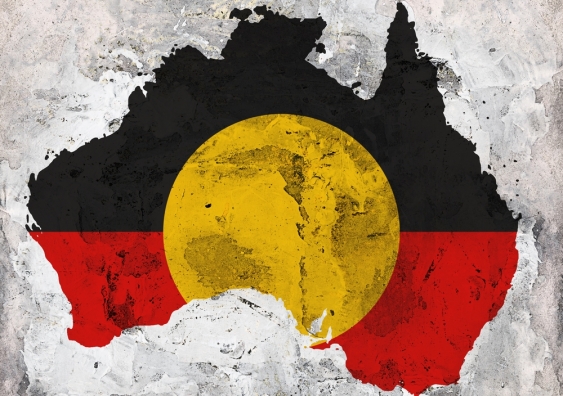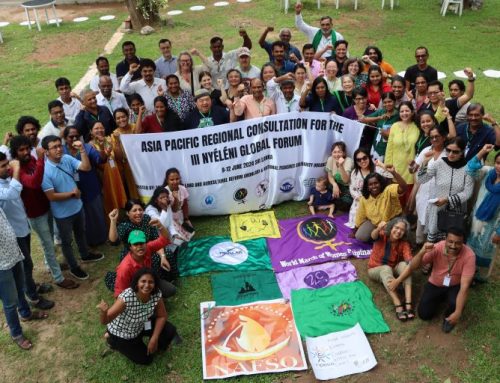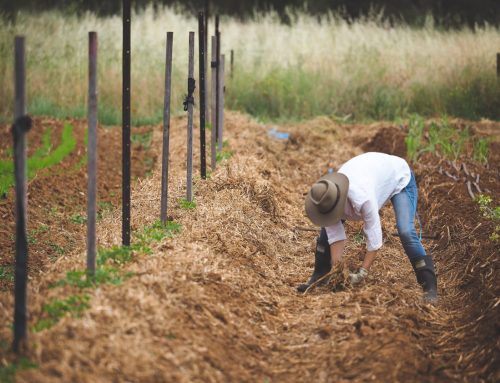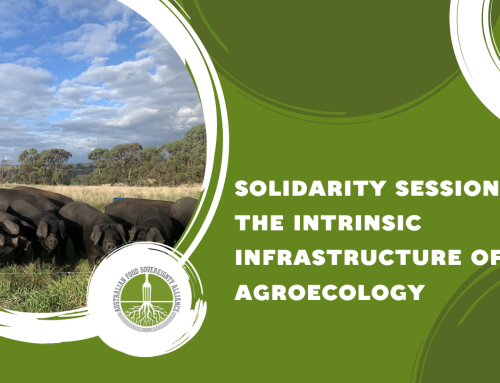AFSA Values & Theory of Change
The 2022 AFSA National Committee have drafted this statement on our organisational values and theory of change. We intend it as a working document, open to members’ feedback and subject to revision until ratification at the 2022 AGM in October.
We uphold the 7 Pillars of Food Sovereignty:
- Food for people
- Builds knowledge and skills
- Works with nature
- Values food providers
- Localises food systems
- Puts control locally
- Food is sacred
We value our relationships with Land, water, and sky, and strive to care for Country and promote First Peoples’ sovereignty in everything we do. We value biodiversity, and support agroecological food production that protects Land, people, and the more-than-human world.
We listen to First Peoples at every opportunity and promote their rights to voice, treaty, and truth as expressed in the Uluru Statement from The Heart. We are embracing custodial ethics, locating our practices, and expressing solidarities with Traditional Custodians on all food sovereignty issues.
We support the movement away from the corporate-controlled, exploitative capitalist food system, which is shaped by unequal systems of power and oppression, and produces commodities for profit instead of food for people. Our solutions must dismantle systemic food injustices rooted in colonialism.
We value all parts of nature over profits. We acknowledge and respect everyone’s work in the food system, including unpaid, underpaid, and devalued labour. We work to honour culture and conviviality, and to protect and restore traditional ways of growing, preparing, sharing, and eating food as a community.
We prioritise community, collaboration, mutual aid, horizontal knowledge exchanges, and equality, seeing them as necessary for and complimentary to individual autonomy. We reject any ideology that promotes individual rights over the public good.
We are concerned about the way the state tries to simplify things that are inherently complex such as agro-ecosystems, food economies, public health and food security through narrow policy and legislation, but we are not ‘anti-government’.
We seek to localise decision making, replacing the state where possible with smaller-scale, democratic collectives that organically emerge, such as citizens’ assemblies that allow direct democratic participation in decision making in local communities, and farmers’ and workers’ cooperatives to regain control of the means of production, distribution, and communication.
We are an anti-capitalist, anti-colonialist, pro-collectivist organisation working to build solidarity across movements working for food sovereignty, food security, climate action, workers’ rights, and against extractive industries. We embrace degrowth as a politics and a practice. Our members embrace a broad spectrum of political ideologies, but as an Alliance, we do not identify with singular labels – we are a pluralist movement of the Left.
We are reformists AND radicals, focusing on practical alternatives (e.g. community-supported agriculture, agroecological farming, community gardens, food hubs) as a way to create ecologically-sound and socially-just food and agriculture systems. We connect these actions with a social movement approach, integrating the goal of destroying the power structures of capitalism. Without this radical transformation, practical actions are at risk of co-optation by neoliberalism.
About AFSA
The Australian Food Sovereignty Alliance (AFSA) is a farmer-led civil society organisation of people working together towards socially-just and ecologically-sound food and agriculture systems that foster the democratic participation of Indigenous Peoples, smallholders, and local communities in decision making processes. FOOD SOVEREIGNTY asserts the right of peoples to nourishing and culturally appropriate food produced and distributed in ecologically sound and ethical ways, and their right to collectively determine their own food and agriculture systems.
The Australian Food Sovereignty Alliance is a not-for-profit association, incorporated in Victoria.
AFSA’s programs of work include legal advice for smallholders, working with all levels of government for legal reform to enable an agroecological transition in Australia, supporting young farmers to secure land tenure, promoting agroecology as a practice, a science, and movement, and promoting First Peoples’ sovereignty and struggle for voice, treaty and truth. AFSA supports localised food economies that put control locally, valuing producers who work with nature to produce food for people, not profits.






